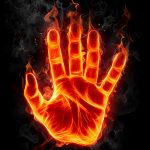
Today’s blog is the result of a profound series of conversations I recently had with someone. We were talking about a harmful emotion that can result from experiencing abuse: Hatred.
Hatred is different than anger. Anger is an emotion. It is, like all other emotions; it’s neither right or wrong nor good or bad. It simply is. In fact, anger serves an important purpose. It signals that something is happening that may require you to fight in order to defend yourself. Anger is best converted into an action: speaking up for yourself, fighting back if attacked, or even physically removing yourself from the presence of the problem. However, when action is not possible (such as might happen with child abuse), anger can linger and settle inside, turning into hatred and resentment, poisoning the person who holds it inside. Some people who have been hurt by others may find that although months or years have passed, they find they are still ruminating and mulling over the hurt and fantasizing about revenge. Unfortunately, often the only person who is hurt by this hatred is the one who feels it. For some who suffer psychogenic seizures, this unhealthy emotion can fuel the seizures and leave the person further incapacitated. When this is the case, the clinician must work to figure out what to do.
What can we do about this?
What is the opposite of hatred? Love. Wouldn’t the hatred that has been held for so long be inevitably displaced if the person fills him/herself with love? But love of what?
Many authors talk about how hatred can be eliminated through the power of forgiveness, eventually one can achieve compassion and even love for the person who committed the wrong and one is set free. This concept appears in many religious writings and I am sure works for some. However, and I certainly don’t mean to start an intense theological debate, this concept seems foreign and an unnatural starting point in the process of healing. Especially when I am sitting in front of a person who has been senselessly and deeply hurt by another human being and is in pain, starting by forgiving the perpetrator, seems inconsistent with what the person is sharing with me. Let’s continue to follow this logic of replacing hatred with love: What approach might be more natural?
Self-preservation (aka self-love) is in our biology. Therefore, perhaps, the most logical and natural love we need to foster and nurture in someone who is filled with hatred is the love that person feels for him/herself. The more one fills up with love and caring for oneself, the more the hurt, rage and the “victim” role fragments and ceases to define the person. Nurturing and achieving love for ourselves can eventually achieve an openness and love of humanity as a whole. At that point, forgiveness can be possible but I see it simply as a by-product.
In order to heal, it is necessary to love oneself. Only in this way can one free oneself of the hatred and from the effects of that terrible experience. By thriving, that trauma ceases to define you. The challenge is to discover your strengths, your purpose, your worth, and your potential for growth and to free all that energy that was tied up in hating and use it to flourish.
Now, let’s spend some time considering these excellent quotes about hate and anger.
I have decided to stick with love. Hate is too great a burden to bear. Martin Luther King, Jr.
You will not be punished for your anger, you will be punished by your anger. Buddha


I am so glad you shared this. I really needed to read this, and remind myself that self love/ compassion must come first. Before, I am able begin to fully forgive and heal.